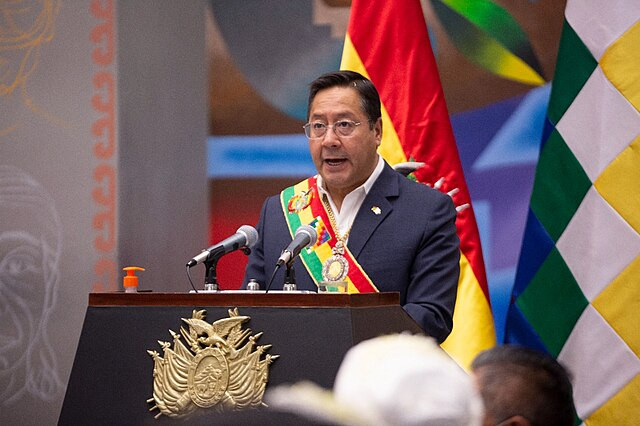Bolivia's government palace came under attack on Wednesday as armored vehicles rammed its doors in an apparent coup attempt. President Luis Arce, however, stood firm amidst the chaos, swiftly appointing a new army commander who ordered the troops to stand down. The confrontation ended with the withdrawal of soldiers and military vehicles, while hundreds of Arce's supporters surged into the square outside the palace, waving flags and singing the national anthem in a show of solidarity.
"Thank you to the Bolivian people," President Arce declared to the crowd. "Let democracy live on."
The coup attempt, led by General Juan José Zúñiga, resulted in his arrest later that day. The Attorney General's office has opened an investigation, though the specific charges against Zúñiga remain unclear. In a twist, Zúñiga claimed that President Arce had orchestrated the event to boost his popularity, a charge vehemently denied by Justice Minister Iván Lima. Lima stated that the general was lying to justify his actions and announced that prosecutors would seek a maximum sentence of 15 to 20 years for Zúñiga "for having attacked democracy and the Constitution."
This rebellion followed months of growing tensions in Bolivia, marked by economic hardships and escalating protests. The political landscape has been further complicated by the rivalry between President Arce and his former ally, ex-President Evo Morales. Both are vying for control of the ruling Movement for Socialism (MAS) party ahead of the 2025 elections.
Despite the initial chaos, the coup attempt appeared to lack substantial support. Even Arce's political rivals united to defend democracy and denounce the uprising. The spectacle, however, shocked a nation all too familiar with political unrest. In 2019, Morales was ousted following a similar political crisis.
As the events unfolded on Wednesday, military vehicles filled the plaza. Before entering the government palace, Zúñiga told journalists, "Surely soon there will be a new Cabinet of ministers; our country, our state cannot go on like this." He claimed that the army was trying to "restore democracy and free our political prisoners," though he stopped short of explicitly stating he was leading a coup.
President Arce confronted Zúñiga in the palace hallway, a moment captured on Bolivian television. "I am your captain, and I order you to withdraw your soldiers, and I will not allow this insubordination," Arce told Zúñiga. Surrounded by his ministers, Arce added, "Here we are, firm in Casa Grande, to confront any coup attempt. We need the Bolivian people to organize."
Shortly after, Arce announced new heads of the army, navy, and air force, and thanked the country's police and regional allies for their support. "I order all that are mobilized to return to their units," declared the newly appointed army chief, José Wilson Sánchez. "No one wants the images we're seeing in the streets."
The armored vehicles then retreated from the plaza, followed by military fighters as police set up blockades outside the government palace. The incident drew widespread condemnation from regional leaders, including the Organization of American States, Chilean President Gabriel Boric, and the leader of Honduras.
Bolivia, a nation of 12 million, has seen its economy decline sharply from being one of the continent's fastest-growing two decades ago to one of its most crisis-stricken. The country has also been grappling with a significant rift within the governing party, with Arce and Morales battling for the future of MAS.
Following Wednesday's chaos, local media reported that Bolivians were stocking up on food and essentials, fearing what might come next. Despite the turmoil, Vice President David Choquehuanca addressed supporters outside the presidential palace, vowing, "Never again will the Bolivian people permit coup attempts."




